2 March 2023
Ballyseedy and Countess Bridge – 100 years on
Remembering the Past

By the beginning of March 1923 the Civil War had taken a terrible toll across Ireland and worse was yet to come, especially in County Kerry. The war was intense there, with fierce fighting and many casualties between the strongly anti-Treaty Kerry IRA and the Free State forces that had invaded by sea at Fenit and captured Tralee the previous August.
Between 17 November 1922 and 26 February 1923 the Free State government had executed 55 Republican prisoners in the jails. Four of these were in Tralee but, as in the rest of the Free State, many more captured Republicans in Kerry were shot dead without charge or trial. The Free Staters in Kerry were led by former close associates of Michael Collins, including intelligence officer David Nelligan. The commander was Major-General Paddy O’Daly, who had been a leading member of ‘The Squad’ in Dublin. O’Daly was a sadist who acted with extreme brutality and later commented “nobody had asked me to take kid-gloves to Kerry, so I didn’t”.
Much of the Free State reign of terror in Kerry was chronicled at the time in the Republican paper Éire - The Irish Nation and later, based on interviews with witnesses and survivors, by Dorothy Macardle in her book ‘Tragedies of Kerry’ published in 1924. There were many tragedies and deaths on both sides. But the conduct of the troops under O’Daly’s command became notorious throughout the length and breadth of Ireland.
On 6 March 1923 in Knocknagoshel five Free State soldiers were killed by a trap-mine. Kerry IRA No. 1 Brigade stated that the main target of their mine had been a Lieutenant O’Connor “who had made a hobby of torturing Republican prisoners in Castleisland”. O’Connor was one of the five killed. O’Daly and his fellow officers were intent on reprisals and, as had begun with the executions in Mountjoy Prison on 8 December, the victims were to be Republican prisoners who were at the mercy of their captors and who had played no part in the Knocknagoshel killings.
The prisoners selected for death had all been captured during February. Some were brutally interrogated by Nelligan, blind-folded, bound with ropes and beaten with a hammer. A group of them were still recovering from such torture when Knocknagoshel happened and when they were selected for revenge. They were held in the Workhouse in Tralee and, in the early hours of of Wednesday 7 March, nine of them were placed in vehicles and driven, with a heavy military escort, to Ballyseedy Cross.
Some of the men were badly injured from the beatings they had received. They were taken down from the lorry, tied closely together with ropes, and placed in a ring with their backs to a log which had a mine beside it. Then the moonlit night was shattered by an explosion. This was followed by gunfire and the sound of grenades exploding. It seemed that all nine men had been blown to pieces. The scene was horrific, so much so that the Free Staters could not properly distinguish the individual corpses. Miraculously, one man, Stephen Fuller, was blown clear into a drain, unnoticed by the Free Staters. He managed to escape to safety and to tell the truth of what happened.
Free State propaganda stated that the men had been killed by an IRA trap-mine while clearing a barricade. The testimony of Fuller and some Free State witnesses who spoke out exposed this as a lie. At Ballyseedy Cross for days afterwards local people witnessed the birds picking from the trees the flesh of the murdered men.
Incredibly, the massacre of Ballyseedy was duplicated, again on injured and brutalised Republican prisoners, on the same day, at Countess Bridge outside Killarney. This time four prisoners were killed with explosives and gunfire and again, miraculously, a comrade, Tadhg Coffey, escaped to tell the horror of the atrocity.
These and many other atrocities of 100 years ago in Kerry are described in Dorothy Marardle’s ‘Tragedies of Kerry’ now republished by Sinn Féin in a centenary edition of the book.
Tragedies of Kerry book launch
Follow us on Facebook
An Phoblacht on Twitter
Uncomfortable Conversations

An initiative for dialogue
for reconciliation
— — — — — — —
Contributions from key figures in the churches, academia and wider civic society as well as senior republican figures





